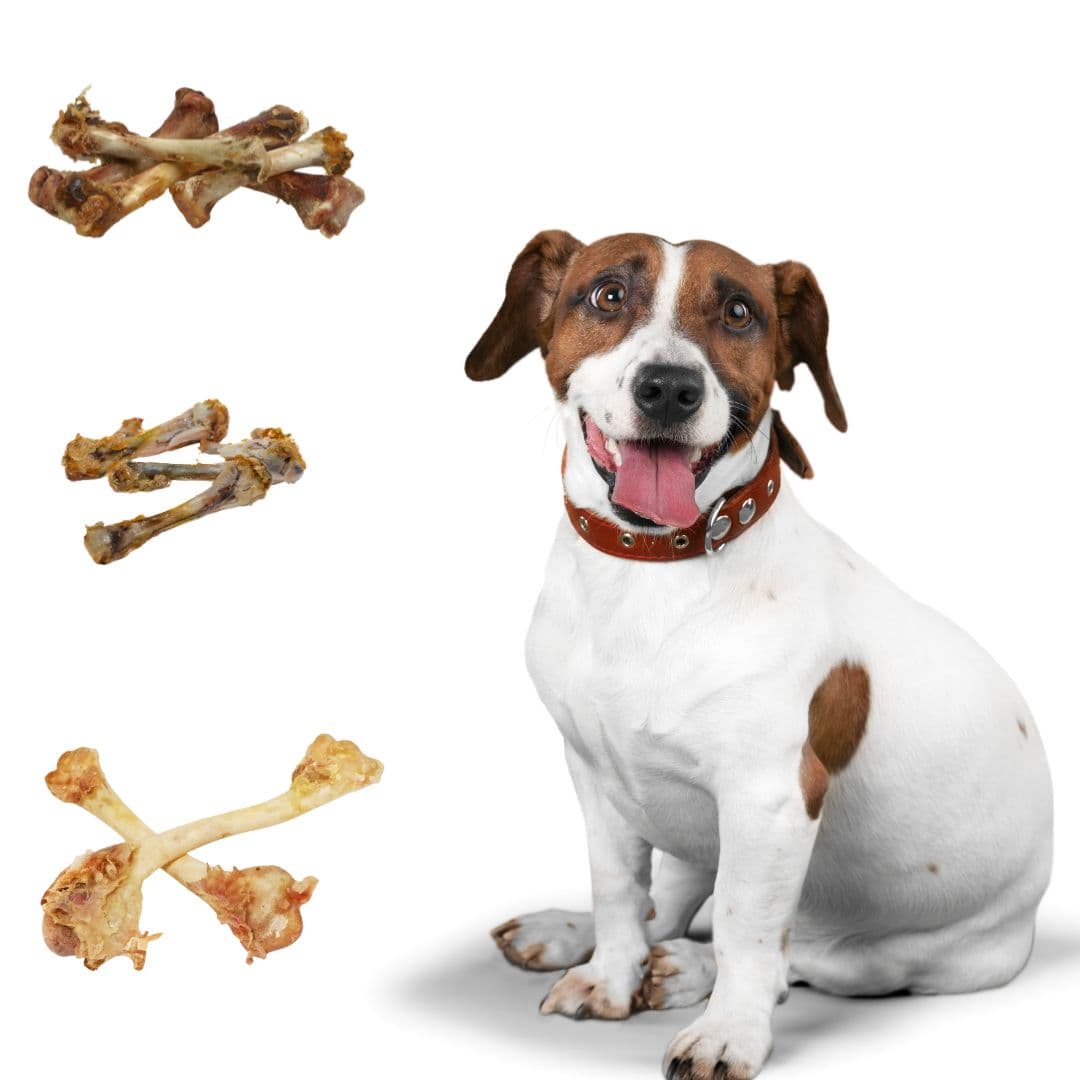It is true, dogs have been eating bones for centuries, and they were just fine. That is, until things go terribly wrong.
In severe situations, blockages or perforations in the GI tract require major surgery, hospitalization, and an extended recovery period, with no guaranteed positive outcome.
When it comes to our dogs, their diet and safety are of paramount importance. So our stand on “Can dogs eat chicken bones” is a resounding NO.
In this comprehensive guide, we will explain the reasons behind this prohibition and address related questions regarding dogs and chicken.
Table of Contents
Are Chicken Bones Bad for Dogs?
Yes, chicken bones are bad for dogs. Chicken bones, whether cooked or raw, can splinter easily, and the sharp fragments can cause significant harm to your dog’s digestive system.
Ingesting chicken bones can lead to choking, mouth injuries, esophageal damage, stomach and intestinal problems, and in severe cases, even a life-threatening condition.
To ensure your dog’s safety, it’s best to avoid giving them chicken bones altogether.
The risks associated with chicken bones far outweigh any potential benefits.
While chicken bone broth and marrow can be part of a balanced diet, consult your veterinarian before introducing any new food into your dog’s diet.
If your dog ingests chicken bones, quick action and veterinary guidance are crucial to ensure their safety and well-being.
What to Do If Your Dog Eats Chicken Bones
If your dog accidentally ate chicken bone, observe your dog for signs of distress, choking, or discomfort.
Don’t try to make them vomit, this can do more harm than good.
If there are any signs of distress, take your dog to the vet.
In most cases, dogs may experience diarrhea and vomiting. Bones will likely be digested.
However, if your dog keeps vomiting or has an urge to vomit, this can indicate some complications, so take them to the vet ASAP.
If your dog doesn’t show any worrying symptoms:
- Feed smaller meals to help faster digestion
- Take your dog for a walk, but avoid complex exercise for a few days
- Make sure your dog is drinking water
- Follow up on the stool. Your dog should pass feces normally.
Potential complications from eating bone

A vet visit is necessary if your dog has pre-existing medical issues or is currently on medical therapy.
Pancreatitis
Dietary changes can trigger pancreatitis. It is a painful inflammatory condition. Treatment requires hospitalization and IV fluids.
Bloat
A life-threatening condition, bloat, requires immediate surgery.
Obstructions
Bones can get stuck and injure your dog through the whole digestive tract, even the mouth. A piece of bone stuck in the esophagus causes excessive drooling, gagging, and vomiting.
The bone can also block airways, in this case, and emergency surgery is required.
Internal perforations are also a common reason for emergency surgery.
Emergency signs after chicken bone ingestion
If your dog shows any of the following symptoms, you must get to the Emergency vet immediately.
- Continuous vomiting (more than once)
- Loss of appetite and stops drinking water
- Abdominal pain, like stretching out or sitting in a hunched position
- Bloated and enlarged stomach
- Inability to pass feces
- Lethargy or unusual behavior
- Coughing or retching
It’s particularly important to discuss the situation with your vet for very young, old, or dogs on medications.
If your dog shows blockage symptoms, X-rays can help diagnose and locate any bones within the digestive tract. However, X-rays may provide limited benefit if your dog has recently ingested the bones and shows no immediate adverse effects.
Can Dogs Eat Raw Chicken Bones?
No, dogs should not eat raw chicken bones. Raw chicken bones, like cooked chicken bones, can splinter and pose a choking hazard or cause internal injuries when consumed by dogs.
Can Dogs Eat Raw Chicken?
Raw chicken may carry harmful bacteria such as Salmonella or Campylobacter, which can affect the dog and pose a health risk to you. Therefore, it’s important to consult with a veterinarian before incorporating raw chicken into your dog’s diet.
Can Dogs Eat Chicken Bone Broth?
Chicken bone broth can be a nutritious and safe addition to a dog’s diet if prepared correctly. Make sure that the bone broth is prepared without any spices, onions, garlic, or other ingredients that can be harmful to dogs.
Bone broth can provide essential nutrients and is often used as a supplement to support joint health in dogs. However, always consult your veterinarian before introducing new food into your dog’s diet.
Can Dogs Eat Chicken Bone Marrow?
Chicken bone marrow is generally safe for dogs to consume when it is part of a balanced diet and in moderation. Marrow is a good source of essential fatty acids and nutrients. Many dog owners use marrow bones as a treat or provide their pets with additional nutrients.
Vet Q&A
- How long can a bone stay in a dog’s stomach?
Typically in healthy younger dogs, you can expect to pass the bone in 24 – 72h. The elimination speed depends on your dog’s age, health, and other factors (food choices, mobility, etc.)
- How soon will a dog show signs of a blockage?
You can immediately see signs of mouth and airway blocage depending on the spot. The dog will attempt to sneeze, cough, and vomit.
In the few hours of bone ingestion, you will notice other symptoms (if there are any blockages), such as vomiting more than once, lethargy, and swollen stomach. In this case, get to the vet ASAP.
My Senior Paws is a participant in the Amazon Services LLC Associates Program, an affiliate advertising program designed to provide a means for sites to earn advertising fees by advertising and linking to Amazon.com. We also participate in other affiliate programs which compensate us for referring traffic.




